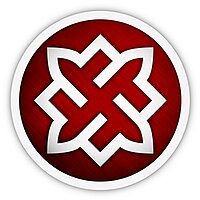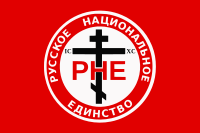RNU
|
Russian National Unity
Русское Национальное Единство |
|
|---|---|
 |
|
| President | Alexander Barkashov |
| Founded | 16 October 1991 |
| Headquarters | Moscow, Russia |
| Ideology | Neo-Nazism |
| Political position |
Third Position (official) Far-right |
| Religion | Russian Orthodoxy |
| International affiliation | World Union of National Socialists |
| Colours | Red |
| Slogan | "Russia for Russians" |
| Party flag | |
 |
|
| Website | |
| rusnation.org | |
Russian National Unity (RNU) or All-Russian civic patriotic movement "Russian National Unity" (Russian: Всероссийское общественное патриотическое движение "Русское Национальное Единство"), is a neo-nazi political party and paramilitary organization based in Russia and formerly operating in states with Russian-speaking populations. It was founded by the ultra-nationalist Alexander Barkashov. The movement advocates the expulsion of non-Russians and an increased role for traditional Russian institutions such as the Russian Orthodox Church.
The organization is currently unregistered federally in Russia.
Promoting the notion of "Russia for Russians and compatriots", members of the party (sometimes called "Barkashovites") endorse policies including the expulsion of minorities that "have their homeland outside Russia," especially Jews and migrants from the South Caucasus, such as Azeri, Georgians and Armenians, as well as other countries. Their vision of Russia is divided into privileged ethnic Russians and "compatriots" - non-Russians who live in Russia and have their national homeland there, including indigenous populations of Russian Far East, North, Turkic, and some other minorities. While they consider these "compatriots" to be entitled to live in Russia, the RNU nonetheless condemns any inter-ethnic and inter-racial marriages, claiming that "they create psychological troubles of self-identification for children from such marriages".
According to the Saint Petersburg Times, new recruits (storonniki, literally: "supporters", "siders") to the organization have traditionally been required to serve as low-level functionaries in the organization, acting as drivers and handing out flyers, as well as attending instructional sessions on the group's philosophy and beliefs, many of which are derived from a book written by Barkashov. As members advance, they may attain the rank of spodvizhniki (literally: archaic, high-style for "co-workers"; "co-endeavourers") and are entitled to wear the insignia and participate in paramilitary training. The most dedicated members advance to the ranks of the soratniki (literally: "comrades-in-arms"), who serve as the leadership of the group.
...
Wikipedia
